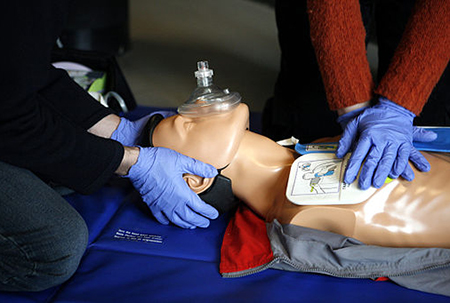Tuesday, Jan 6, 2015
CPR training led by peers and faculty available at the University
by Aimee LaBrie
For the Rider community, the tools needed to save a life are just a heartbeat away. A new program offered by the Student Government Association's Heartsavers club aims to expand lifesaving CPR skills among Rider students, faculty and staff. To date, seven American Heart Association-certified trainers on the Lawrenceville campus are able to provide three levels of CPR training. In early December, the trainers met with eight students, most of them science majors and members of Rider’s pre-med club, and certified them in CPR and the use of an automated external defibrillator (AED).
Classes were organized and taught by the already-certified Rider students and faculty, who serve as representatives of Capital Health and the American Heart Association. Held on a Saturday in the science building, the participants received training over two sessions lasting three hours each. They trained on both the AED as well as a life-sized manikin, learning life-saving skills such as how to do chest compressions, how to perform CPR and how to maintain a clear airway. At the end of the sessions, they received official certification from Capital Health, as well as a card giving them two years of certification.
“If everyone knew CPR, Rider’s campus and community would be an even safer place,” says Dr. Bryan Spiegelberg, assistant professor in chemistry and physics, himself a CPR instructor.
Making this opportunity available to members of the Rider community was inspired by senior Juliana Ciccarelli, a GEMS double major who is just finishing up her student teaching. She worked tirelessly with Capital Health and to make sure they had everything they needed to get others properly trained and certified.
"Heart disease is the number one killer in the United States, and we need to get more people educated about how to save someone's life," says Ciccarelli. "When I first took over the Heartsavers project on campus, it was just me. With the help of the executive board, we were able to grow exponentially. Now, we're a club community of over 200 students who want to learn more and to help others."
Aside from being a life-saving mechanism in case of an emergency, the training is also applicable to many careers, particularly in the healthcare field. Having the certificate provides students with a professional edge.
Spiegelberg sees this as just the beginning. “We plan to do several classes a semester, starting in January,” he says. “We will get organized early in the semester."
If you or your organization are interested in participating in one of the three levels of certification, or if you would like to join Rider Heart Savers, contact Spiegelberg at bspiegelber@rider.edu.

